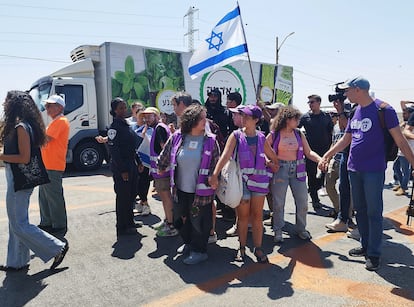Clashes in Israel between supporters and opponents of aid flows to Gaza: "We don't want to feed Hamas terrorists!"

On one side of the road, around thirty Israeli ultras gathered by the far-right organization Tsav 9, some with Israeli flags tied like capes. On the other side, a similar number of people, the so-called "guardians of solidarity" of the Standing Together organization, wearing purple bibs to distinguish themselves. Some are trying to prevent trucks carrying humanitarian aid from entering Gaza through the Kerem Shalom border crossing. The others are ensuring that they do not succeed and that the supplies reach their destination.
This Wednesday, two segments of Israel—one calling for food to be denied to starving Gazans and the other demanding an increase in aid—faced each other again on the asphalt. In the midst of the dispute, four World Food Program trucks carrying tons of flour and other goods were stopped by extremist protesters, only to continue on their way through the intervention of activists and police. The background noise was the honking of the huge line of stuck vehicles and the rumble of bombs in the Gaza Strip, just five kilometers away.
“We don't want to feed Hamas terrorists!” the extremists shouted. “One of the hostages, an elderly man who was released, said he never received medicine, even though it was given to the Red Cross. How can we ensure that food reaches the hostages? We can't. So why give anything?” one of the protesters explained, stressing that she lost many friends in the Islamist militia's attack on October 7, 2023, in which more than 1,200 Israelis were killed and more than 250 captured.
Asked whether it might make more sense to accept a ceasefire to secure the release of the 58 hostages still held in Gaza (a third of whom are believed to be still alive), as was achieved in the January truce—broken unilaterally by Israel on March 18—the young woman replies: “Some people don’t understand peaceful negotiation. Some people, especially Arabs, only understand force.”
“We're here because there are people dying of hunger , and this [blocking aid] isn't a solution; we have to end the war, we have to get at least 600 trucks a day back into Gaza,” argues Dotan Vaisman, a member of Standing Together. “And there are more of us who want an end to the war,” he says, quickly recounting his colleagues and those who are fighting.
These incidents, aimed at obstructing the transport of goods into the Gaza Strip, are becoming more frequent—they occur practically every week. However, their mobilization power is diminishing. In February of last year, they attracted up to 200 people. At that time, 27,000 Gazans had died in the war. This Wednesday, the latest death toll was estimated at 54,607; almost 100 in the previous 24 hours, according to the Ministry of Health of the Hamas-controlled enclave.

Despite the difficulties posed by extremists, an average of 100 trucks carrying aid cross the Gaza border at Kerem Shalom every day, according to the Israeli military. Before the conflict, the average was around 500 or 600 vehicles per day. The aid arriving today is insufficient for the enclave's 2.1 million inhabitants, all of whom are facing extreme food insecurity, and half a million at risk of famine , according to the UN.
Furthermore, supplies crossing the border are inspected before receiving the green light from the Israeli army for distribution, which does not always happen quickly or with sufficient security guarantees for proper distribution, NGOs and the UN have repeatedly denounced.
The situation in Gaza is growing increasingly desperate. Following the deaths of more than 100 Gazans from Israeli gunfire as they sought food at one of the distribution points run by the Gaza Humanitarian Fund (GHF) , a US- and Israeli-backed organization, the organization suspended distributions on Wednesday.
The UN World Food Programme itself has reported that Gazans are forced to scavenge for food or consume expired food to survive amid the extreme shortage of basic supplies. "The last resort families resort to is to search for food on the streets or in the garbage, consuming discarded leftovers," the agency stated. Another desperate strategy, it added, is that Gazans are forced to reduce the portions of the meals they manage to obtain, resulting in malnutrition in particularly vulnerable populations such as children, pregnant women, and the elderly.
“The world watches, day after day, horrific scenes of Palestinians being shot, injured, or killed in Gaza while trying to eat,” said Tom Fletcher, UN Humanitarian Coordinator (OCHA), in a statement. “No one should have to risk their lives to feed their children.”
That's why he has once again called on Israel to open all border crossings and allow the entry of aid on a large scale. "Ensure that our convoys are not hampered by delays and denials. Lift the restrictions on what and how much aid we can bring," he urged in his letter.
This is a demand shared by the members of Standing Together, who are focusing on their own government. “We are fighting for change to come from within. We don't believe that outside intervention can change the situation. And we have come from all over the country to show that there are many of us who support the Palestinian people. At least today this aid will reach them,” says one of its members, celebrating the arrival of a truck.
EL PAÍS





